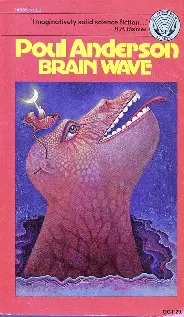Brain Wave, 6.
Brain Wave has to be Poul Anderson's most philosophical work. In it, he writes a damning indictment of Western civilization.
Peter Corinth reflects on what he sees as a typical human being, a factory or office worker:
"...his mind dulled to a collection of verbal reflexes..." (p. 59)
Is it really that bad? How many people do not think but merely repeat a set of words in response to each new input? Individuals, groups within society and social policy need to do something about developing minds, not dulling them.
Corinth's litany continues. Each day, this typical person merely eats and is anaesthetized by screened entertainment. There is:
"...an inward hollowness..., an unconscious realization that there ought to be more..." (ibid.)
Increased intelligence enables the typical person to see that his life is miserably inadequate, that his work is trivial and that his beliefs and conventions are narrow and meaningless. (I am paraphrasing Anderson's text, not adding my own comments here!)
Something needs to be done about all this now - and not just waiting for intelligence to increase.

5 comments:
Kaor, Paul!
And "whatever" is done will never be wholly satisfactory because we are, all of us, imperfect, flawed, prone to folly and vice and conflict. We can only somehow manage and cope with ourselves to some degree. To expect perfection, short of the second coming of Christ, is Utopian unrealism.
And that was Anderson's basic belief as well, as stated both in others of his works and in private letters to me.
Ad astra! Sean
Our evolution did not happen to make us happy. It happened to make us successfully reproductive, in the environment in which we evolved.
Indeed. Now that we are self-conscious and intelligent, we can decide to "pursue happiness." We can formulate aims that include but also go beyond successful reproduction.
Kaor, Paul!
And many will continue to make bad choices, mistaken choices, or choices we don't like.
Ad astra! Sean
Sean,
They not only will. They do. But biological evolution has taken us beyond itself. It has enabled us to change the environment instead of adapting to it. We are selected to help others either because they bear the same genes or because they might help us in return and we experience this motivation as moral obligation, not as self-interest. This is the origin of human morality.
Paul.
Post a Comment